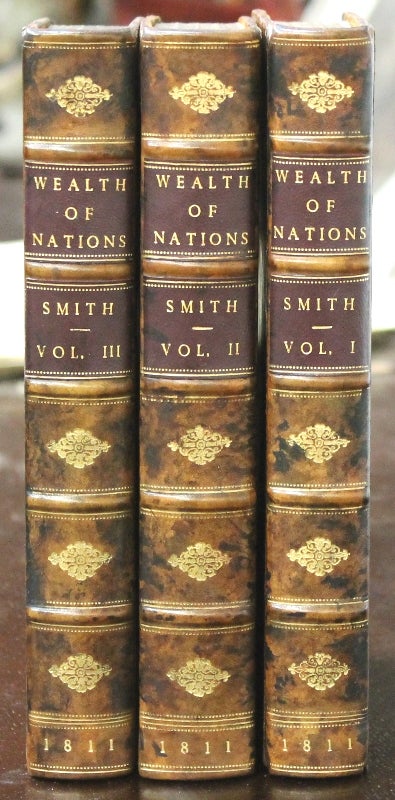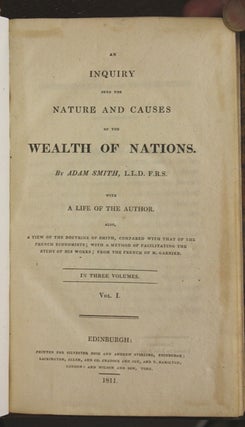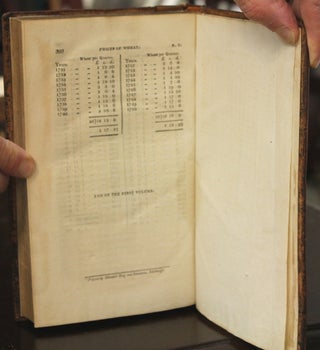An Inquiry into the Nature and Causes of the Wealth of Nations
Edinburgh. c. 1811. Binding: Fine contemporary tree calf, rebacked expertly in matching calf, spine with 5 raised bands, morocco labels on 2 & 3. , Notes: Adam Smith FRSA (1723-1790) was a Scottish economist, philosopher and author as well as a moral philosopher, a pioneer of political economy and a key figure during the Scottish Enlightenment. Smith wrote two classic works, The Theory of Moral Sentiments (1759) and An Inquiry into the Nature and Causes of the Wealth of Nations (1776). The latter, often abbreviated as The Wealth of Nations, is considered his magnum opus and the first modern work of economics. Smith studied social philosophy at the University of Glasgow and at Balliol College, Oxford, where he was one of the first students to benefit from scholarships set up by fellow Scot John Snell. After graduating, he delivered a successful series of public lectures at Edinburgh, leading him to collaborate with David Hume during the Scottish Enlightenment. Smith obtained a professorship at Glasgow, teaching moral philosophy and during this time, wrote and published The Theory of Moral Sentiments. In his later life, he took a tutoring position that allowed him to travel throughout Europe, where he met other intellectual leaders of his day. Smith laid the foundations of classical free market economic theory. The Wealth of Nations was a precursor to the modern academic discipline of economics. In this and other works, he developed the concept of division of labour and expounded upon how rational self-interest and competition can lead to economic prosperity. Smith was controversial in his own day and his general approach and writing style were often satirised by Tory writers in the moralising tradition of William Hogarth and Jonathan Swift. In 2005, The Wealth of Nations was named among the 100 best Scottish books of all time.
Today, Wealth of Nations is a fundamental work in classical economics. By reflecting upon the economics at the beginning of the Industrial Revolution, the book touches upon such broad topics as the division of labour, productivity, and free markets. The Wealth of Nations was the product of seventeen years of notes and earlier works, as well as an observation of conversation among economists of the time concerning economic and societal conditions during the beginning of the Industrial Revolution, and it took Smith some ten years to produce. The result, An Inquiry to the Wealth of Nations, was a treatise which sought to offer a practical application for reformed economic theory to replace the mercantilist and physiocratic economic theories that were becoming less relevant in the time of industrial progress and innovation. The Wealth of Nations represented a clear paradigm shift in the field of economics, comparable to Sir Isaac Newton's Principia Mathematica for physics, Antoine Lavoisier's Traité Élémentaire de Chimie for chemistry, or Charles Darwin's On the Origin of Species for biology.
, Size: 8vo, Illustration: For this edition, a comparative view of the doctrines of Smith and the French economists, and a method of facilitating the study of Mr. Smith’s inquiry, by Germain Garnier, of the National Institute, translator of this work into the French language.
, Volume: Three volumes, Pages: P. Vol (1), title, advertisement (2 leaves), contents (2 leaves), short account of the life and writings of Smith (i- lxiii), introduction (1-4), 5-352, prices of wheat (4 leaves); vol (2), title, contents (iii-vi), introduction (1-4), 4-512, appendix (513-514); vol (3), title, contents (iii-v), 1-443, index (24 leaves)., Category: Book Social Sciences. A fine and handsome example of this important work. Item #B6004
Binding: Fine contemporary tree calf, rebacked expertly in matching calf, spine with 5 raised bands, morocco labels on 2 & 3. , Notes: Adam Smith FRSA (1723-1790) was a Scottish economist, philosopher and author as well as a moral philosopher, a pioneer of political economy and a key figure during the Scottish Enlightenment. Smith wrote two classic works, The Theory of Moral Sentiments (1759) and An Inquiry into the Nature and Causes of the Wealth of Nations (1776). The latter, often abbreviated as The Wealth of Nations, is considered his magnum opus and the first modern work of economics. Smith studied social philosophy at the University of Glasgow and at Balliol College, Oxford, where he was one of the first students to benefit from scholarships set up by fellow Scot John Snell. After graduating, he delivered a successful series of public lectures at Edinburgh, leading him to collaborate with David Hume during the Scottish Enlightenment. Smith obtained a professorship at Glasgow, teaching moral philosophy and during this time, wrote and published The Theory of Moral Sentiments. In his later life, he took a tutoring position that allowed him to travel throughout Europe, where he met other intellectual leaders of his day. Smith laid the foundations of classical free market economic theory. The Wealth of Nations was a precursor to the modern academic discipline of economics. In this and other works, he developed the concept of division of labour and expounded upon how rational self-interest and competition can lead to economic prosperity. Smith was controversial in his own day and his general approach and writing style were often satirised by Tory writers in the moralising tradition of William Hogarth and Jonathan Swift. In 2005, The Wealth of Nations was named among the 100 best Scottish books of all time.
Today, Wealth of Nations is a fundamental work in classical economics. By reflecting upon the economics at the beginning of the Industrial Revolution, the book touches upon such broad topics as the division of labour, productivity, and free markets. The Wealth of Nations was the product of seventeen years of notes and earlier works, as well as an observation of conversation among economists of the time concerning economic and societal conditions during the beginning of the Industrial Revolution, and it took Smith some ten years to produce. The result, An Inquiry to the Wealth of Nations, was a treatise which sought to offer a practical application for reformed economic theory to replace the mercantilist and physiocratic economic theories that were becoming less relevant in the time of industrial progress and innovation. The Wealth of Nations represented a clear paradigm shift in the field of economics, comparable to Sir Isaac Newton's Principia Mathematica for physics, Antoine Lavoisier's Traité Élémentaire de Chimie for chemistry, or Charles Darwin's On the Origin of Species for biology.
, Size: 8vo, Illustration: For this edition, a comparative view of the doctrines of Smith and the French economists, and a method of facilitating the study of Mr. Smith’s inquiry, by Germain Garnier, of the National Institute, translator of this work into the French language.
, Volume: Three volumes, Pages: P. Vol (1), title, advertisement (2 leaves), contents (2 leaves), short account of the life and writings of Smith (i- lxiii), introduction (1-4), 5-352, prices of wheat (4 leaves); vol (2), title, contents (iii-vi), introduction (1-4), 4-512, appendix (513-514); vol (3), title, contents (iii-v), 1-443, index (24 leaves)., Category: Book Social Sciences.
Price: $2,750.00




